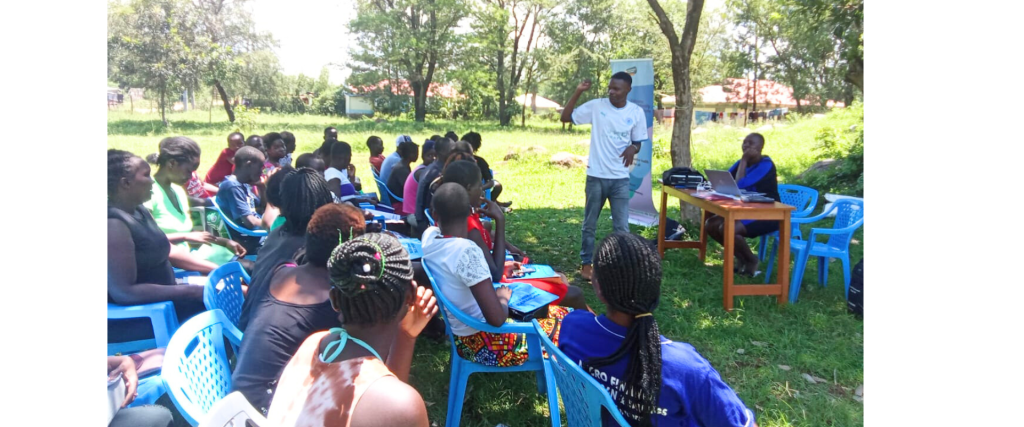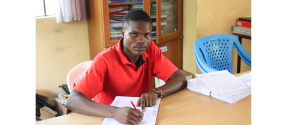The power of resilience, breaking barriers of adversity and societal prejudice for SRHR advocacy
 25 April 2024
25 April 2024

Sylvester Adhaya’s story depicts the true meaning of a life of resilience. A young man of 26 years, is an inspiring Make Way youth champion who has an unwavering determination to shape and transform his society through advocating for SRHR of the young people
 I first experienced the Intersectional Community Score Card Process when I visited one of our Local Partner Organizations, St Francis Oriang’ Development Programme (SODP), In Seme Sub County, Kisumu County. I was met with a humble-spoken youth leading the session, he sounded incredibly intelligent and a confident individual, who expertly articulated each point with precision.
I first experienced the Intersectional Community Score Card Process when I visited one of our Local Partner Organizations, St Francis Oriang’ Development Programme (SODP), In Seme Sub County, Kisumu County. I was met with a humble-spoken youth leading the session, he sounded incredibly intelligent and a confident individual, who expertly articulated each point with precision.
The rest of the youth participants were glued to his words, eagerly absorbing knowledge and thoroughly enjoying the session. The youth was leading other participants on how they would pursue the Intersectional Community Scorecard (ICSC) Process with the health service Providers.
Life and Education
Sylvester Adhaya’s story depicts the true meaning of a life of resilience. A young man of 26 years, is an inspiring Make Way youth champion who has an unwavering determination to shape and transform his society.
Despite his humble background and financial constraints, Sylvester is driven by an unrelenting passion to make a positive impact on the lives of those around him. His vision is to create a better future for his community, as he works tirelessly to achieve his goals.
Nyalik Village is situated within the rural outskirts of Kisumu County’s Seme Sub County, North Alungo Sub Location. The village is known for its serene rocky and hilly landscape, and the main economic activities are farming and fishing. However, the community faces numerous challenges, including limited access to social amenities and facilities like healthcare. Many families in the village struggle to provide food for themselves, and most children lack access to education due to a lack of scholastic materials. Unfortunately, Sylvester’s family is not immune to these challenges.
Growing up as a village boy, he had to face numerous difficulties such as hunger, walking barefoot to school, constant criticism from the villagers, and being bullied due to his vulnerable situation. However, he never lost his determination to overcome these challenges and create a brighter future for himself.”
“In a family of ten children, where education was the only hope but it was a challenge due to lack of school fees, the general community members doubted whether we could access education nor make it in life because we were 10 children born at close intervals and my parents were poor, we were defined by poverty in my village,” he narrated.
Amidst all these challenges he remained focused hoping that one day he would make history and through perseverance, he joined the university to study Bachelor of Education.
“Despite being of the age and generation where one would expect a lavish and modern lifestyle while in university, my experience was quite different. Instead of resorting to irresponsible behaviors to earn pocket money, I chose to cook porridge and sell it to my fellow students. This decision was met with criticism from my peers, who saw me as an abnormal and old-fashioned young man.” he narrated.
He went on to say “Irrespective of growing up in poverty, I was determined to pursue my education. However, the villagers often questioned how I would manage to do so as society tends to view education and poverty as incompatible.
Experience and skills
Sylvester had been yearning for more knowledge and seeking interventions on how he could change the perception the villagers have concerning his family and that is why during the long holidays in his second year of study, he visited SODP offices to learn more and pursue something new and that was when he was allowed to offer support in the data entry, under the Orphans and Vulnerable Children’s (OVC) sector.
After the holidays, Sylvester continued his education with great enthusiasm and dedication until he completed his fourth year of study. He became the first person in his village to graduate from a university, which came as a shock to the villagers. They were amazed at how he managed to achieve this feat despite being from a poverty-stricken family. Sylvester’s graduation became an inspiration to his peers in the village.
After graduating with a Bachelor degree in Education from one of the top universities in Kenya, he visited the SODP offices to inquire about any volunteering opportunities. He had been discouraged after being rejected for a job at one of the schools in the city and was disheartened to see his documents thrown into the litter bin by the secretary who had promised to call him back.
Another aspect of challenges many youths face after pursuing their education- is joblessness and unemployment besides childhood challenges and poverty, where some resort to irresponsible behaviors as some get contained in the pool of mental health.
In Kenya, for development to be achieved, quality education is one of the indicators towards realizing this, especially in the rural settlement.
Many youths struggle for employment spaces as most opt for self-employment or volunteering options, which at times end in vain and some opt for irresponsible behavior changes.
Involvement in the Make Way Programme
“In 2023, May after finishing my fourth year of study at the university, I came back to SODP to enquire of any available opportunities and a friend told me of a new program being implemented called the Make Way,” he hinted.
He keenly read the Make Way Programme- manual and considered it his constitution.
“I was selected to be a youth champion in the Make Way Programme, and on June 15th, together with other young persons we submitted a memo on Kisumu County Fiscal strategy paper FY 2022/2023, besides doing more on capacity building, and now the ICSC processes, which has benefitted the youths in the grassroots areas in terms of accessing the information on their SRH Rights”. He said.
“Through my involvement in the Make Way Programme, I have been able to learn more about SRHR, especially in the ICSC process whereby I was a trainer of trainers and I could get the opportunity to advocate for the rights of young persons through involving the policy bearers,” he added
His involvement in the program has also opened various avenues for him to sensitize youths in his home area and many look after him and would want to access education and be like him.
He concluded by saying that, his involvement in the program and learning more about policies, has gained him prominence in his home area and even his parents are well pleased with his empowerment in the program and he can be consulted for ideas concerning education by his peers.
“The empowerment youths get from the various programs should not just end when the projects face out but should have a long-term impact on the development of our societies, where youths can lead and have a voice.” He said.



